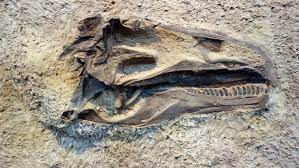Science News Roundup: Patagonian fossils show Jurassic dinosaur had the herd mentality; Vikings crossed the Atlantic 1,000 years ago and more
Scientists said on Thursday the fossils include more than 100 dinosaur eggs and the bones of about 80 juveniles and adults of a Jurassic Period plant-eating species called Mussaurus patagonicus, including 20 remarkably complete skeletons. Big John - named after the owner of the land where the dinosaur's bones were found - roamed modern-day South Dakota more than 66 million years ago.

Following is a summary of current science news briefs.
Goodbye, Columbus: Vikings crossed the Atlantic 1,000 years ago
Long before Columbus crossed the Atlantic, eight timber-framed buildings covered in sod stood on a terrace above a peat bog and stream at the northern tip of Canada's island of Newfoundland, evidence that the Vikings had reached the New World first. But precisely when the Vikings journeyed to establish the L'Anse aux Meadows settlement had remained unclear - until now.
South Korea's Moon vows 'Korea space age' after rocket test falters
South Korea's first domestically built space rocket blasted off on Thursday, but failed to fully place a dummy satellite into orbit, delivering mixed results for a test launch that represents a major leap for the country's ambitious space plans. The three-stage KSLV-II Nuri rocket, emblazoned with the national flag, rose on a column of flame from its launch pad at Naro Space Center at 5 p.m. (0800 GMT).
Patagonian fossils show Jurassic dinosaur had the herd mentality
A vast trove of fossils unearthed in Argentina's southern Patagonia region is offering the oldest-known evidence that some dinosaurs thrived in a complex and well-organized herd structure, with adults caring for the young and sharing a communal nesting ground. Scientists said on Thursday the fossils include more than 100 dinosaur eggs and the bones of about 80 juveniles and adults of a Jurassic Period plant-eating species called Mussaurus patagonicus, including 20 remarkably complete skeletons. The animals experienced a mass-death event, probably caused by a drought, and their bodies were subsequently buried by wind-blown dust, the researchers said.
Remains of 'Big John', largest known triceratops, fetch nearly $8 million
A private, anonymous U.S. collector bought the fossilised remains of 'Big John', the largest triceratops dinosaur ever discovered by paleontologists, for 6.65 million euros ($7.74 million) at a Paris auction on Thursday. Big John - named after the owner of the land where the dinosaur's bones were found - roamed modern-day South Dakota more than 66 million years ago.
(With inputs from agencies.)
- READ MORE ON:
- Newfoundland
- Jurassic
- Moon
- Columbus
- Argentina
- South Dakota
- U.S.
- Canada
- Paris
- Korea
- Atlantic
- South Korea's
- Patagonia
ALSO READ
Russia says new South Korean sanctions are 'unfriendly', will respond
South Korea's Yoon meets doctors in first sign of flexibility over walkout
Olympics-Macron says he has no doubt Russia will target Paris Olympics
Negotiator for South Korean walkout doctors sees 'no future' after Yoon meeting
Olympics-France's Macron says he has no doubt Russia will try to target Paris Olympics










